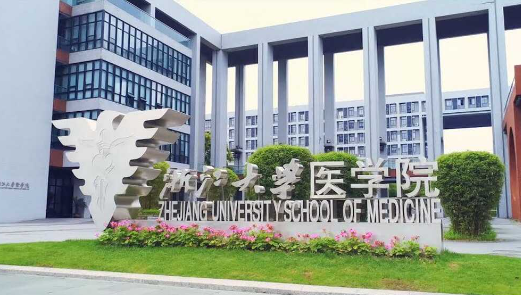The annual tuition fee for Zhejiang University Medical School is approximately 42,800 RMB for undergraduate programs.
Table of Contents
Overview of Zhejiang University Medical School
Zhejiang University, located in the historic and picturesque city of Hangzhou, stands as one of China’s oldest, most selective, and most prestigious higher education institutions. Its Medical School, established as a significant part of the university, carries a reputation for excellence in both teaching and research. The Medical School boasts state-of-the-art facilities and a diverse community of students and faculty, reflecting a commitment to cutting-edge medical education and research.

Brief History and Reputation
The Medical School of Zhejiang University traces its origins back to the early 20th century, consistently evolving to meet the challenges of modern healthcare and medical research. Known for its rich history, the school has played a pivotal role in shaping medical education in China. It has produced a significant number of medical professionals who have contributed to the advancement of healthcare both nationally and internationally. The school’s reputation is bolstered by its strong alumni network, ongoing research projects, and collaborations with top global institutions.
Programs Offered
At the forefront of medical education, Zhejiang University Medical School offers a wide range of programs catering to various aspects of healthcare and medical science. These programs include undergraduate degrees in Medicine, Nursing, and Pharmacy, as well as specialized postgraduate courses in areas like Public Health, Clinical Medicine, and Biomedical Engineering. Each program integrates theoretical knowledge with practical skills, ensuring that graduates are well-equipped to address contemporary medical challenges. The school’s focus on interdisciplinary research, coupled with its collaborations with leading healthcare providers, adds significant value to its educational offerings.
Detailed Fee Structure of Zhejiang University Medical School
Understanding the fee structure of Zhejiang University Medical School is crucial for prospective students. The school provides a transparent breakdown of costs, ensuring students can plan their finances effectively.
Tuition Fees for Different Programs
The tuition fees at Zhejiang University Medical School vary depending on the program and level of study.
- Undergraduate Programs: The average annual tuition fee for undergraduate programs like MBBS (Bachelor of Medicine, Bachelor of Surgery) is approximately 42,800 RMB. This cost reflects the comprehensive education and hands-on training offered.
- Postgraduate Programs: For postgraduate courses, such as Masters and PhD programs in medical sciences, the fees range from 45,000 to 55,000 RMB per year. These programs offer advanced learning opportunities, including research and specialized clinical training.
It is important for students to regularly check the university’s official website or contact the admissions office for the most current fee information, as these figures can change.
Additional Costs (Accommodation, Books, etc.)
Besides tuition, there are additional costs to consider:
- Accommodation: On-campus housing is recommended for its convenience and community environment. The cost ranges from 6,000 to 12,000 RMB per year, varying by dormitory type and amenities.
- Books and Supplies: Annually, students should budget around 2,000 to 3,000 RMB for textbooks and other academic materials. This cost can vary based on the course requirements.
- Living Expenses: Living in Hangzhou, students should budget approximately 1,500 to 2,500 RMB per month for expenses like food, transportation, and personal needs.
Scholarships and Financial Aid at Zhejiang University
Zhejiang University offers a comprehensive range of scholarships and financial aid programs to support students financially throughout their academic journey. These scholarships aim to encourage academic excellence and provide opportunities for students from diverse backgrounds.
Types of Scholarships Available
Zhejiang University provides various scholarships for both domestic and international students. These include:
- Zhejiang University Scholarship: This scholarship covers full or partial tuition fees and is available to undergraduate and postgraduate students.
- Chinese Government Scholarship: Offered to international students, it covers tuition, accommodation, medical insurance, and provides a monthly stipend.
- Confucius Institute Scholarship: Specifically for students interested in Chinese language and culture, covering tuition and living expenses.
Each scholarship has specific criteria focusing on academic achievement, research potential, and extracurricular contributions.
Eligibility and Application Process
The eligibility criteria for each scholarship at Zhejiang University vary:
- Academic Excellence: Most scholarships require a strong academic record. For postgraduate scholarships, research output and publications can be a significant factor.
- Financial Need: Some scholarships consider the financial background of the applicant, aiming to support those in need.
- Extracurricular Activities: Active participation in community service and extracurricular activities can enhance the chances of receiving a scholarship.
The application process typically involves:
- Application Submission: Students must apply for scholarships either through the university’s online portal or through government scholarship websites.
- Required Documents: This includes academic transcripts, letters of recommendation, a statement of purpose, and any relevant research publications.
- Deadlines: Adhering to application deadlines is crucial. They usually fall several months before the academic year starts.
Comparison of Fees with Other Medical Schools in China
A comparative analysis of the fee structure of Zhejiang University Medical School with other leading medical schools in China provides insights into the value for money each institution offers. This comparison considers tuition fees, living expenses, and the quality of education and facilities.
Comparative Analysis with Similar Institutions
Here’s a table comparing Zhejiang University Medical School with two other prominent medical schools in China:
| Institution | Annual Tuition Fee (RMB) | Living Expenses (RMB/Year) | Program Highlights |
|---|---|---|---|
| Zhejiang University Medical School | 42,800 (Undergraduate) | 18,000 – 24,000 | Comprehensive curriculum, state-of-the-art facilities |
| Peking University Health Science Center | 45,000 (Undergraduate) | 20,000 – 26,000 | Renowned for research, modern medical techniques |
| Shanghai Jiao Tong University School of Medicine | 48,000 (Undergraduate) | 22,000 – 28,000 | Advanced clinical training, international collaborations |
Value for Money Assessment
When assessing the value for money:
- Zhejiang University offers competitive tuition fees with a strong focus on holistic medical education and cutting-edge research facilities.
- Peking University stands out for its intensive research programs and innovative medical practices, justifying its slightly higher fees.
- Shanghai Jiao Tong University provides exceptional clinical training and global exposure, making its higher fees reasonable for the quality offered.
Admission Requirements for Zhejiang University Medical School
Gaining admission into Zhejiang University Medical School is a competitive and stringent process, designed to select students who demonstrate the potential and dedication needed for a career in medicine. The admission criteria encompass academic prerequisites, language proficiency, and other essential qualifications.
Academic Prerequisites
Undergraduate Programs:
- High School Diploma: Applicants must have a high school diploma with excellent grades, particularly in science subjects such as Biology, Chemistry, and Physics.
- Entrance Exams: Performance in relevant entrance examinations, either national (like the Gaokao in China) or international standardized tests, is critically evaluated.
Postgraduate Programs:
- Bachelor’s Degree: A Bachelor’s degree in a relevant field, preferably with a focus on medical or biological sciences.
- GPA Requirements: A minimum GPA (usually above 3.0 on a 4.0 scale or equivalent) is required to demonstrate academic competence.
Language Proficiency and Other Criteria
Language Requirements:
- Chinese Programs: Proficiency in Chinese, usually demonstrated by HSK (Hanyu Shuiping Kaoshi) level 4 or higher.
- English Programs: For programs taught in English, a high TOEFL or IELTS score is required. Typically, a TOEFL score above 90 or an IELTS score above 6.5 is expected.
Other Criteria:
- Personal Statement: A well-crafted personal statement outlining the applicant’s motivation, career aspirations, and why they choose Zhejiang University.
- Letters of Recommendation: Letters from academic or professional references that attest to the applicant’s suitability for medical study.
- Interview: Some programs may require an interview, either in person or via video conference, to assess the candidate’s communication skills, motivation, and suitability for the medical profession.

Student Life at Zhejiang University
Student life at Zhejiang University offers a rich tapestry of experiences, balancing academic rigor with a vibrant campus life.
Campus Facilities and Amenities
Zhejiang University’s campus is renowned for its blend of traditional Chinese architecture and modern facilities.
Libraries and Learning Centers: The university boasts several well-equipped libraries with extensive collections and state-of-the-art learning resources. The main library is home to over 7 million volumes, providing a vast repository of knowledge for students.
Laboratories and Research Centers: Cutting-edge laboratories and research centers enable students to engage in groundbreaking research, contributing to their field of study.
Health and Wellness Facilities: The campus includes a fully equipped hospital, fitness centers, and sports complexes to ensure the physical well-being of students.
Dining and Accommodation: A variety of dining options cater to diverse tastes, with multiple cafeterias and restaurants offering both local and international cuisine. The university also provides comfortable and affordable student housing, with well-furnished dormitories and residential complexes.
Extracurricular Activities and Community Engagement
Extracurricular activities form a vital part of the student experience at Zhejiang University.
Clubs and Societies: The university hosts over 200 student-run clubs and societies, ranging from academic and cultural to sports and arts, providing students ample opportunities to pursue their interests and hobbies.
Cultural Events and Festivals: Regular cultural events, workshops, and festivals celebrate the diverse backgrounds of the student body and promote cultural exchange.
Community Service and Volunteerism: Students are encouraged to participate in community service initiatives and volunteer programs, fostering a sense of social responsibility and community engagement.

